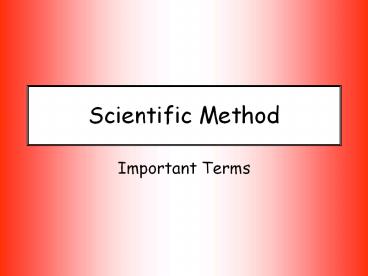Scientific Method - PowerPoint PPT Presentation
Title:
Scientific Method
Description:
Scientific Method Important Terms Observations data that are descriptions of qualities such as shape, color, taste, feel, etc acquired by using your senses Two ... – PowerPoint PPT presentation
Number of Views:77
Avg rating:3.0/5.0
Title: Scientific Method
1
Scientific Method
- Important Terms
2
Observations
- data that are descriptions of qualities such as
shape, color, taste, feel, etc - acquired by using your senses
- Two Types
- Objective observation
- Subjective observation
3
2 Types of Observations
- Objective
- an observation based on fact
- fact a piece of information that can be
strictly defined and proved true.
- Subjective
- an observation based on opinion
- opinion a statement that expresses a belief,
value, or feeling
4
Objective or Subjective?
- Science looks like fun today!
- Subjective
- Kanye Wests songs sound good!
- Subjective
- The counter-tops in class are black!
- Objective
- School French fries taste good!
- Subjective
- The summer was too short!
- Subjective
- There are sixty seconds in a minute!
- Objective
5
Objective or Subjective?
- Which type of observations should be used in
science? - Objective observations should be used in
science because they are based on facts and the
basis of science is to identify the facts!
6
Inference
- an explanation that tries to make sense of your
observations - influenced by your experiences/prior knowledge
- these explanations may not be true
- Example
- Observation
- John was breathing heavily as he walked into the
classroom. - Possible Inferences
- He ran to class because he was going to be late
- He just played basketball in gym
7
What would you infer?
- Everyone is closing their book because
- Many students buy French fries because
- Students arrived to class sweaty because
- 4. All of the students are laughing because
8
Hypothesis
- a working explanation or trial answer to a
problem - an educated guess
- can be written in the form of an If..., then...,
because... statement - Example
- If an individual increases his/her activity
level, then their heart rate will increase
because the bodys muscles (cells) will require
more oxygen to function at a higher level. A
faster beating heart will increase blood flow
thus, allowing an increased concentration of
oxygen to reach the cells in need.
9
Control Group
- a group of subjects in an experiment that are not
given any special treatment - something that is not manipulated
- same as the experimental group in every possible
way, except for the factor being tested - Example
- The resting heart rate represented the baseline
heart rate to which any increase in activity
level was compared to.
10
Constants
- Factors in an experiment (both in the
experimental and control groups) that are kept
the same and not allowed to change - Examples
- One minute was consistently the amount of time
allotted to perform the necessary activity - The type of activity performed
- The stopwatch used during data collection
- The method used to measure the heart rate
11
Variables
- things that can be assigned or take on different
values in an experiment - any factor that can change
- Two Types
- 1. Independent
- 2. Dependent
12
Two Types of Variables
- Independent
- variables that are purposely changed or
manipulated in an experiment - the factor that you wish to test
- usually expressed after the word if in the
hypothesis - could be thought of as the cause in a cause and
effect relationship - Example
- The activity level (resting, walking, running)
- Dependent
- variables that may change as a result of the
independent variable - the factor you measure to gather results
- usually expressed after the word then in the
hypothesis - could be thought of as the effect in a cause
and effect relationship - Example
- The persons heart rate
13
Identify the Variables
independent variable
- If a student chooses to not study, then they will
earn a poor grade. - If you drink Gatorade before a soccer game, then
you will score more goals. - If you increase the mechanical advantage of a
pulley system used to move an object, then the
input force becomes less.
dependent variable
independent variable
dependent variable
independent variable
dependent variable
14
Data
- factual information
- Two Types
- 1. Quantitative
- 2. Qualitative
15
2 Types of Data
- Quantitative
- data consisting of numbers
- Example
- Heart rate (80 beats/minute)
- Qualitative
- data consisting of verbal descriptions or
information gathered using scales without numbers - Examples
- Verbal description of heart rate (fast or slow)































